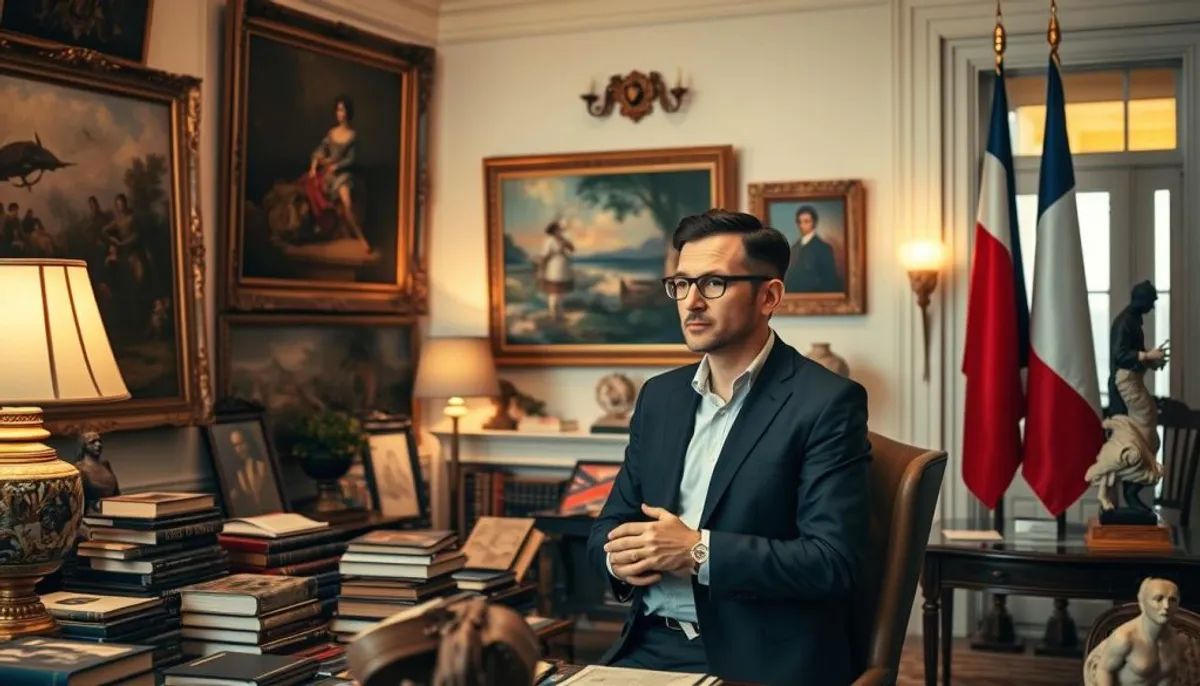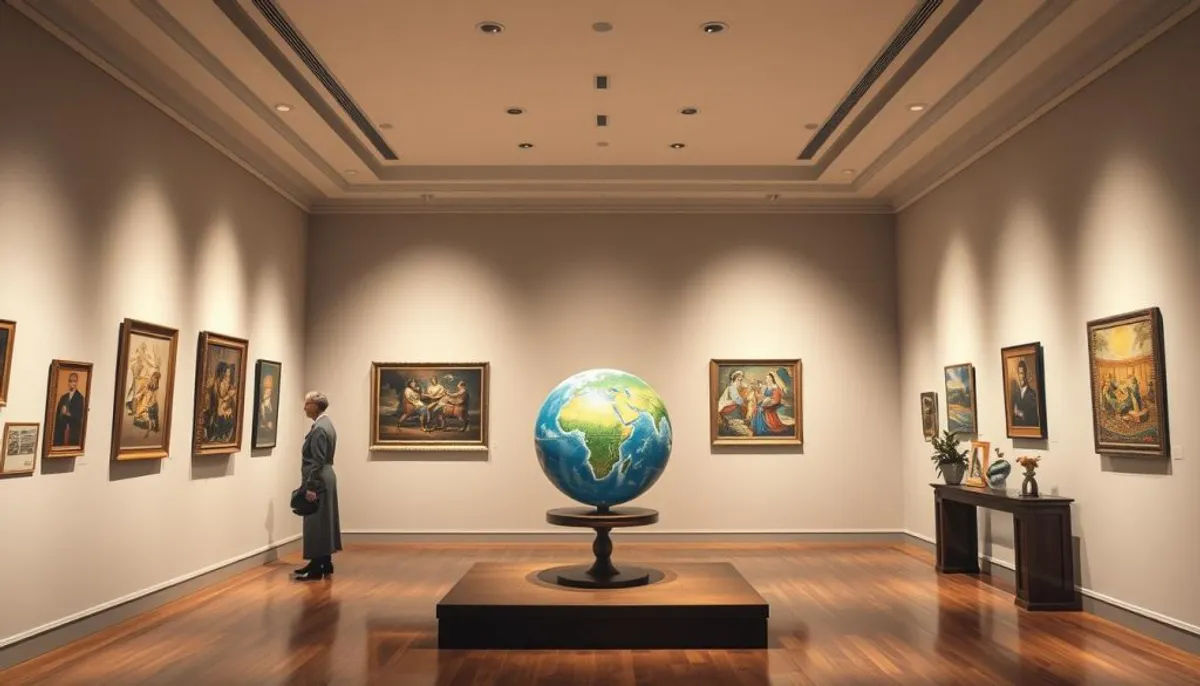
The cultural advisor plays a central role in French cultural diplomacy. Located in French embassies abroad, he is responsible for promoting French culture internationally. This role is essential for France's presence on the global stage.
The starting salary of the cultural advisor is approximately €1,500 net per month. He works within the French embassy to enhance France's image. His work includes organizing cultural events, managing French cultural institutes, and developing partnerships in various fields, including education.
To access this position, a degree at the bac+4/5 level is generally required. The Orient competition, open to those under 30, is the main entry route. However, competition is intense, with only a few dozen positions available each year. Mastery of English and an Eastern language is crucial to succeed in this highly competitive exam.
Who is the cultural advisor and what are his main responsibilities
The cultural advisor holds a prominent position in cultural diplomacy. He is essential for the influence of France abroad. His tasks are numerous and critical for the promotion of French culture and international cooperation.
The role of diplomatic representation
The cultural advisor is a major player within French embassies. 85% of them work there, dedicating an average of 30% of their time advising the ambassador on cooperation and cultural action issues. They must understand the local society and identify collaboration opportunities.
The promotion of French culture abroad
The main mission of the cultural advisor is to promote French expertise and culture. 75% of them adapt to new forms of dissemination, particularly digital. They organize events, coordinate partnerships, and seek funding. Nearly 70% are involved in fundraising from public and private donors.
The management of French cultural institutes
In some countries, the cultural advisor leads the network of the French Institute. He manages a team of about twenty people on average, as in Lisbon. He must mobilize resources to implement programming and achieve the embassy's objectives. 45% have in-depth skills in budget management to effectively manage these resources.

The cultural advisor juggles between diplomacy, management, and cultural promotion. His role is essential for strengthening French cultural presence internationally and fostering exchanges between countries.
The missions and areas of intervention of the advisor
The cultural advisor occupies a central position in the dissemination of French culture internationally. He engages in a multitude of tasks, covering essential areas for cultural promotion.
Organization of cultural events
Organizing cultural events is a primary mission for the advisor. He creates exhibitions, conferences, and festivals, showcasing French art and culture. For example, the DRAC Grand Est leads numerous cultural events in its 10 departments.
Coordination of international partnerships
The advisor engages in the development of international partnerships with local and foreign institutions. These collaborations foster deep cultural exchanges. The DRAC plays a key role in land planning and promoting social cohesion.
Management of resources and budget
The management of cultural resources is a major responsibility of the advisor. He supervises cultural attachés and manages the budget for activities. For example, the department of Indre allocates nearly €900,000 annually to support music schools and artistic education.
The advisor must navigate these multiple missions to promote French culture abroad. His role is essential to ensure and amplify France's cultural influence internationally.
The required skills and qualifications
The role of cultural advisor requires a specific set of skills and qualifications. Training in cultural diplomacy is crucial to succeed in this role. Candidates must hold a bac+4 or bac+5 degree, often from prestigious institutions such as Sciences Po or INALCO.
Intercultural skills play an essential role. A cultural advisor must be extremely adaptable and possess a deep understanding of various cultures. Mastery of several foreign languages is also vital for effective communication with international interlocutors.

| Skills | Description |
|---|---|
| Diplomacy | Ability to negotiate and represent cultural interests |
| Project management | Organization of events and coordination of partnerships |
| Cultural knowledge | Expertise in French culture and the host country |
| Communication | Interpersonal skills and public relations sense |
| Administrative management | Rigorous management of resources and budgets |
Candidates must also have significant experience in the cultural sector. This field is dominated by small structures, requiring great versatility. The ability to scientifically analyze works, develop budgets, and seek funding is particularly valued, while considering cultural influence on projects.
Career prospects and working conditions
The diplomatic career presents a range of opportunities for cultural advisors. They are essential in the promotion of French culture internationally. Their role is crucial in making French culture known around the world.
Possible places of work
Cultural advisors primarily work abroad. They are present in French embassies, consulates, and cultural institutes around the globe. This geographical diversity offers a rich and multicultural professional experience.
Compensation and benefits
The salary of cultural advisors depends on their experience and the location of their assignment. The base salary is approximately €1,500 net per month, excluding bonuses. Additional benefits, such as housing or residency allowances, may be offered due to expatriation.
| Compensation element | Approximate amount |
|---|---|
| Base salary | €1,500 net/month |
| Bonuses | Variable depending on the position |
| Expatriation allowance | 10-30% of salary |
Professional advancements
The diplomatic career offers significant advancement opportunities. Cultural advisors can access positions of increased responsibility within the French diplomatic or cultural network. Some progress to sectoral responsibility roles or as advisors in cooperation and cultural action.
To thrive, skills in project management and foreign languages are crucial. English is an essential asset, and mastery of the language of the host country is a major advantage for a successful diplomatic career.
Conclusion
The role of cultural advisor is fundamental in cultural diplomacy. It combines diplomatic skills and expertise in cultural management. This creates unique opportunities to enhance the international influence of France. Cultural advisors are essential for promoting cultural diversity, thus stimulating creativity and innovation on a global scale.
Despite challenges, such as competition for positions and budget constraints, this profession remains attractive. It draws those passionate about culture and international relations. Statistics reveal an increase in the number of protected cultural workers, expanding the role of advisors. Their work improves understanding of global markets and strengthens intercultural communication.
In summary, the role of cultural advisor is continuously evolving, responding to current challenges. It plays a crucial role in the international influence of France, fostering exchange and mutual understanding between cultures. This dynamic profession offers a unique chance to contribute to global cultural diplomacy.
RelatedRelated articles


